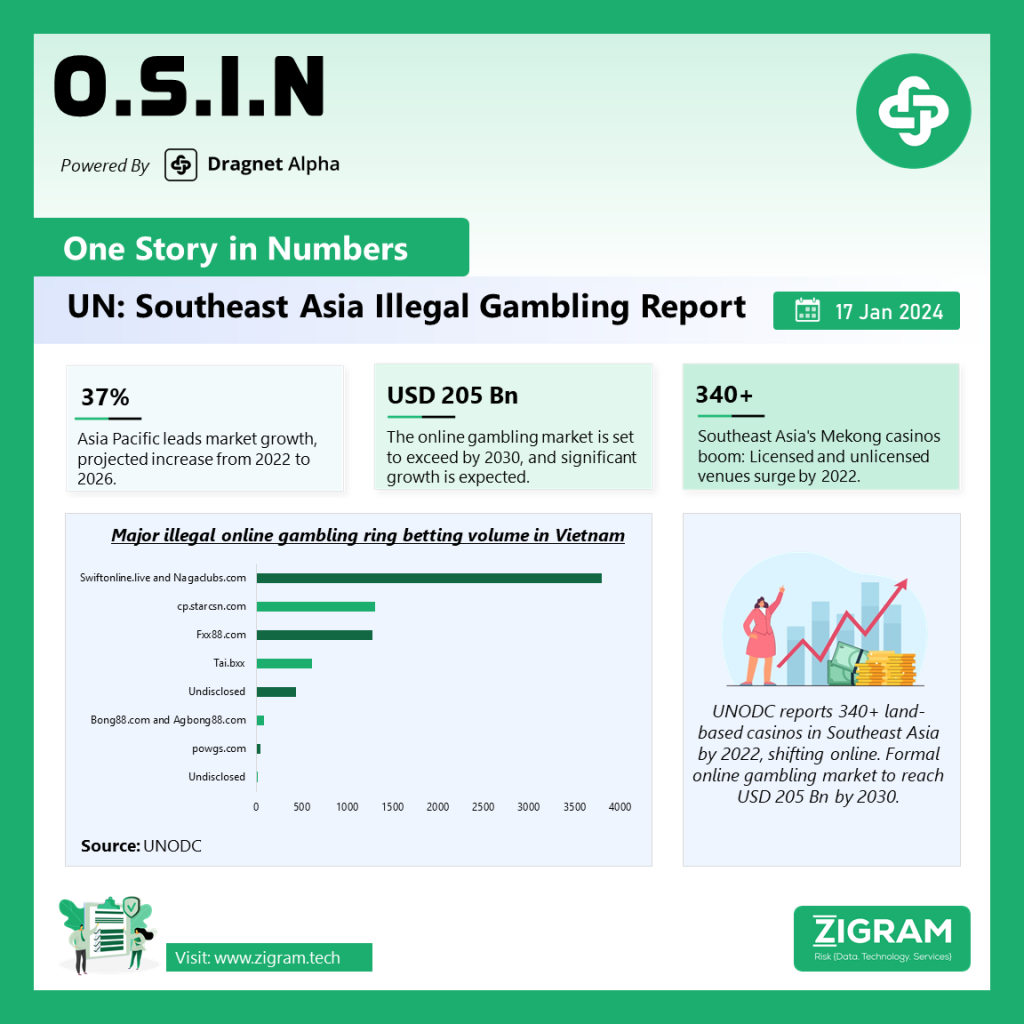Published Date:
The UNODC analysis reveals a complex landscape of gambling, organized crime, and illicit activities in Southeast Asia, particularly the Mekong region. As of early 2022, over 340 licensed and unlicensed land-based casinos were operating in the area, with a notable shift to online platforms offering live-dealer streaming and proxy betting services. The formal online gambling market is expected to surpass $205 billion by 2030, with the Asia Pacific region projected to contribute significantly, representing a 37% growth between 2022 and 2026.
The study emphasizes the policy developments and enforcement measures implemented by regional governments to tackle issues such as illegal capital outflows, corruption, and money laundering associated with casino activities. The report also highlights the historical involvement of Taiwan PoC-based organized crime groups in Southeast Asia, tracing back to the heroin trade and evolving into activities such as synthetic drug production, trafficking, money laundering, underground banking, and the emergence of online casinos and cyber fraud.
Taiwan PoC’s influence extends to the Mekong region, with a focus on Cambodia in recent years. Taiwanese networks have targeted Cambodia for the illicit manufacture and trafficking of synthetic drugs, particularly ketamine. Seizures of ketamine have risen significantly, reaching 2.8 tons in 2021 and over 13.5 tons in 2022. Law enforcement efforts, including joint operations with U.S. and Taiwanese authorities, have resulted in substantial arrests and seizures, uncovering clandestine laboratories, and disrupting drug trafficking networks.
A disturbing revelation from Taiwan PoC authorities involves the exploitation of Taiwanese job seekers in Cambodia. A group lured 82 individuals, subjecting them to prison-like conditions and forcing them into cybercrime activities. The group reportedly earned $1.67 million in commissions for placing these individuals into “cyber slavery.” In a separate incident, police in Taiwan PoC uncovered residential buildings where 58 victims were held captive for money laundering purposes. Unlike similar cases in the Mekong, these victims were not forced into criminal activities but rather used as instruments in a sophisticated money laundering process. The perpetrators controlled nearly 100 bank accounts using the identities and documents of the enslaved victims, generating approximately $12.66 million from victims of investment scams.
The findings underscore the intricate connections between organized crime, online gambling, and various illicit activities in the region. The recommendations provided in the technical policy brief aim to strengthen knowledge, legislation, and enforcement responses to address these complex challenges. The involvement of Taiwan PoC-based groups in a range of criminal activities, from drug trafficking to cybercrime and money laundering, highlights the need for coordinated efforts and enhanced measures to curb the influence of these criminal networks in Southeast Asia, particularly the Mekong region.
The report paints a vivid picture of the multifaceted challenges posed by the convergence of organized crime, online gambling, and illicit activities in Southeast Asia. The study’s comprehensive analysis provides valuable insights for policymakers, law enforcement, and stakeholders seeking to address and mitigate the impact of these criminal enterprises on regional stability and security.
- #MekongCrime
- #OnlineGamblingTrends
- #OrganizedCrimeAnalysis
- #AsiaPacificGrowth
- #EnforcementMeasures
- #CasinoSecurity
- #IllegalGambling
- #TaiwanPoC
- #MoneyLaunderingRisk
- #CybercrimeNetworks

